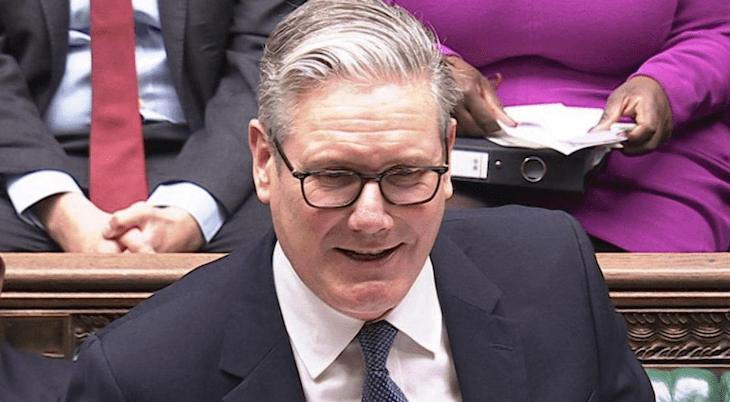
It’s been a good week for fans of TV dramas that are set partly in Syria, feature poetry-lovers confronting extreme violence, like to keep their viewers in the dark (sometimes literally) and have main characters with Australian accents (sometimes accidentally). But there are also significant differences between the two examples on display – with The Narrow Road to the Deep North the much more sombre and The Veil the considerably more bonkers.
Adapted from Richard Flanagan’s Booker-winner, The Narrow Road began in Syria in 1941. Through what would prove the programme’s characteristic murk, a group of Australian soldiers led by one Dorrigo Evans could just about be seen rescuing a young boy and joshing about the respective size of their penises. Within minutes, however, they were interrupted mid-josh by an explosion that killed one of their comrades and the rescued boy.
In the first of the constant time-shifts, it was then 1942, with Dorrigo’s wife Ella anxiously awaiting news of him following the Australian troops’ surrender to the Japanese. Immediately afterwards came 1989, where the older Dorrigo (Ciaran Hinds) was being interviewed about his wartime experiences by a smug young journalist to whom he explained that people like her think war is only one thing (i.e. wrong) whereas in fact it’s many things at once.
And with that, we headed to 1940 where the younger Dorrigo (Jacob Elordi) proposed to Ella, before starting an affair with his uncle’s wife, Amy: an affair kindled by their shared love of Sappho’s poem ‘You Burn Me’ (full text: ‘You burn me’). A couple of minutes – and three years – later he was among the Australian prisoners arriving in the Thai jungle to build a railway…
Although the TV adaptation makes a few of the usual inexplicable plot-tweaks, it’s essentially faithful to the book – not least in all those time-shifts and the main reason for them. This is that, despite the unbearably vivid scenes of suffering and Japanese cruelty in the jungle, The Narrow Road isn’t primarily a war story, but a piercing character study filtered through the memory of old Dorrigo and designed to show how he, too, has ended up many different things at once. He is, for instance, simultaneously guilt-ridden and rather chuffed about his long-ago affair with Amy, grateful to and resentful of Ella, determined not to be haunted by the war and haunted by the war.
And it’s that last contradiction in particular that lends the show its power, as Dorrigo finds himself unable to do anything so impossibly glib as ‘move on’. However much you might wish it, this tough but gripping drama bleakly reminds us, some stuff just won’t go away.
In recent years, there’s been a lot of talk about whether there’ll ever be a female James Bond – but in The Veil we sort of get one. Sunday’s opening episode even had a pre-credit sequence in which our heroine (Elisabeth Moss) completed her previous mission in an immaculate suit and with a few quips to the baddie, who also became the first of many characters to fix her with a wondering stare and ask, ‘Who are you?’
At this stage, the viewer’s answer to that question was a firm ‘search me’ – and so it remained as she adopted the name Imogen and headed to a refugee camp in Syria. There, the man from Unicef was soon asking the same thing, especially after she’d overcome several assailants in a fight, having put down her omnipresent cigarette. (Ian Fleming readers might remember the striking sentence in Casino Royale: ‘Bond lit his seventieth cigarette of the day.’) In another Bondian touch, it also helps that everybody who shoots at her always misses.
Very gradually, it became apparent that Imogen is an MI6 agent sent to the camp to find a suspected Isis commander who, this being television, is a woman too. Once she had, though, she naturally went rogue. Charged with driving Adilah to a detention centre, Imogen instead headed to Istanbul while the two women spent their road trip companionably discussing both terrorism and English poetry.
After the downtrodden misery of The Handmaid’s Tale, you can see why Moss might have wanted to go full-on alpha female. Less understandable is why she didn’t spend more on a voice coach – because her English accent is all over the place: sometimes OK; sometimes accurate syllable by syllable yet still somehow sounding like no English person ever has; sometimes flat-out Aussie.
The Veil is written by Steven Knight who can be great (Peaky Blinders) and can be dreadful (Great Expectations), but here is mostly somewhat annoying. The dialogue is often corny, the kickass heroine levels feel almost parodic and nothing is remotely plausible. Nonetheless – and this is the properly annoying bit – there’s still enough intrigue and mad fun to keep us watching.








Comments